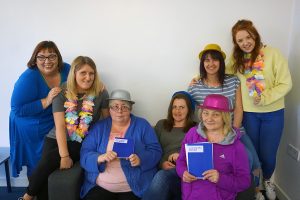Rhiann McLean (Iriss) talks us through the Buddy tool, designed to help women entering the criminal justice system and to improve their experience.
In 2016/17, I worked with the Glen Isla project, a women’s criminal justice centre based in Arbroath, to develop the Buddy tool. Buddy was co-designed by women and practitioners to improve the experience of beginning a journey in the criminal justice system. We worked over a very short period of time (three months) in which we were warmly welcomed into the day-to-day running of Glen Isla, and were able to forge relationships with women and staff.
This project was based on relational approaches which value relationships between women and practitioners, as well as women and other women in the centre. These relationships were central to the women achieving their outcomes, as they helped them feel supported even in their most challenging moments. I was able to observe various one-to-one and group interactions within the centre, and draw on these to suggest key themes to the women and practitioners. I was struck by the similarities across the women’s stories and the role that relationships (both negative and positive) had on their ability to live the lives they wanted.
During the co-design process, the women who attended Glen Isla identified key stages where having a ‘Buddy’ would have made them feel more secure and reduced their anxiety. These key stages were: starting the service and deciding to access support, attending referrals/appointments, joining a group setting, and leaving the service. It was interesting to hear the women reflecting on their journey – the assumptions they made and the anxieties that prevented them from engaging with staff. From the staff’s perspective, engagement with the service was key to the women achieving their outcomes. They were keen to ensure that the women felt welcomed.
Although the tools are designed to make these key stages easier to navigate for a person entering a service for the first time, practitioners also valued the expertise that women had to offer, and the potential that taking on a mentoring role could have in supporting their self-esteem. The co-design process wasn’t always easy, and we learned some important lessons about why we should seek interventions that put relationships first and don’t focus on reading and writing. Because of this, we don’t see Buddy as a long written exercise, but as a prompt for supportive conversations.
From my own perspective as Project Manager, the work was at times challenging. We needed to balance what it meant to be a ‘Buddy’ – the women were also on their own journey which required them to focus their energy on themselves and their families. However, ultimately we wanted to create something that would support the natural alliances and friendships that we see across all of the services we support, and I hope that the Buddy tool does this.
The Buddy tool is made up of 24 cards designed to be used by somebody with lived experience of the service (Supporter), and somebody entering the service (Buddy), to help alleviate fears and overcome barriers by sharing experiences and developing plans together. Although this tool was designed in the criminal justice system, we have seen it requested across a variety of settings including children and families teams. The tool can be used in both one-to-one and group settings and is a blend of activities, reflection and celebration. Buddy can be incorporated into existing peer support programmes, or can be used more informally on a case by case basis. What I would like people to take away from the tool is that we don’t expect it to be used as a script, but if you can find just one card or one exercise that is helpful to you, that means that the tool is doing its job.
New beginnings can be hard no matter what the setting, so I hope that people from across health and social care services can benefit from using Buddy. It is free of charge to anyone who wants to use it, however, we do ask to get in touch for feedback when your team has tried out the tool. Please get in touch with rhiann.mclean@iriss.org.uk to request your Buddy packs.

About our blogger
Rhiann McLean is Project Manager for the Innovation and Improvement team at Iriss. Read more.

Leave a Reply
You must be logged in to post a comment.